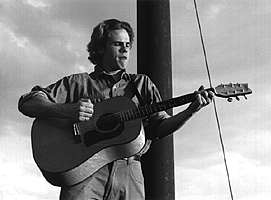

Like any composer, Josh Ritter hopes to give his audience a tune to carry home with them. Or perhaps give them a message about love or life or death. Or perhaps impress them with his guitar playing, or lull them with his singing. Whatever his aim, all who attended the Cat in the Cream last Monday night were left with something.

Ritter's dedication to his work - a growing repertoire of over 150 songs - and his ability to communicate are characteristics key to his growing success. On Sunday, September 13, he will perform at the Kent State folk festival, which will feature such legends as Arlo Guthrie and Richie Havens. This coming March, Hungry Ear records will release a collection of his most recent material. As a 21-year-old from Moscow, Idaho, he is at least a decade younger than other artists on the folk circuit, an amazing feat in itself.
At the age of four, Ritter was taught by the Suzuki School method, where he learned to play the violin by ear. Ritter had not, however, learned to read music notation until his first theory course last year, after he made the switch from a Neuroscience major to an independent major in Narrative American Folklore. He values his acute aural memory tremendously, and admits that he needs improvement on his rhythm and reading.
In his junior year of high school, Ritter first heard recordings of Johnny Cash and Bob Dylan, musicians who inspired him to take up the guitar. "I hadn't written much poetry, but I was trying to teach myself different ways of writing, and you know, learning the guitar. I thought songs would be great because you just use the same three chords over and over again.
"Like playing the violin, or painting, song writing is a craft. You do it for a variety of reasons at different times. Whereas I might write a song just because I get up in the morning and it's there, some songs you write deliberately, to get a message out." His song, "Don't Forget My Name," falls into the category of the latter. After Oberlin hosted the AIDS quilt, Ritter questioned what he could do in memory of those who died-the answer presented itself clearly.
"Arrogant Man," another of his songs played last Monday night, is written from the perspective of an Earth betrayed by man's thoughtlessness. "Motel Song" was a stunning portrayal of the life of a lonely interstate motel owner and, on a much lighter note, "Stuck to You" was a stab at the whims of studying science.
As his inspiration for lyrics have varied, so have his styles in self-accompanying. Upon hearing Gretchen am Spinnrad, one of Schubert's lieder for voice and piano, he chose to use the same device in his own song "Potter's Wheel." For Schubert, painting the text meant giving the pianist a constantly flowing figure in order to simulate the spinning wheel. Ritter used a similar device with his guitar and in reference to the wheel of the potter.
Ritter has tried writing in the same style as popular artists, "using their vocabulary," and would recommend this exercise as an extremely helpful one to anyone trying to write. In actual covers for artists, he approaches the task with extreme care. "A bad cover song is when a person takes it and is not true to the spirit in which it was created. [Covering a song is] paying credence to the people who wrote it, feeling something akin to the way they felt when first writing it."
Ritter spent last semester in Scotland, studying the folklore archive at the School of Scottish Studies. "Traditional music is so highly valued there," Ritter said, casting a dim light on America's attitude towards their own musical heritage. "With all that is going on in music today, and in a place like here - a first-rate conservatory - I feel we should be having serious discussions about American cultural music study. I mean how could we not be!"
Country boy: Senior Josh Ritter is performing this week at the Kent State Folk Festival. (photo courtesy Josh Ritter)
Copyright © 1998, The Oberlin Review.
Volume 127, Number 2, September 11, 1998
Contact us with your comments and suggestions.